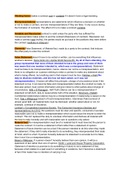Vitiating factor:makes a contract void or voidable if it doesn’t have a legal standing.
Misrepresentations:representations are statements which influence a decision on whether
or not to make a contract, and are misrepresentations if they are false. It only occurs during
the formation of contracts. The effect of it is to make a contract voidable.
Voidable and Rescission:contract is valid unless the party who has suffered the
misrepresentation takes action to end the contract (Rescission of contract). Rescission can
make a contract void (nullity), the parties would be put back in the positions they were before
the contract (restitutio in integrum)
Elements:False Statement, of Material fact, made by a party to the contract, that induces
the other party to enter the contract.
False Statement:doesn’t have to be verbal or written, can be everything that influences
another's decision, Spice Girls Ltd v Aprilia World Service BV (by all of them attending, the
group represented that none of them intended to leave the group and none of them
was aware that one member intended to, which was a misrepresentation). Statement
must be false to be misrepresentation, hence, silence can not be a misrepresentation, and
there is no obligation on a person wishing to enter a contract to make any statement about
what is being offered, but anything said in that respect must be true, Fletcher v Krell (No
duty to disclose materials, and she has not been asked, so it was not
misrepresentation). 3 factors will affect this principle: change of circumstance (even if the
statement is true, it can become false and misrepresentation before the contract is made. In
that case person must correct information and give notice to other parties about change of
circumstance, With v O’Flanagan), Half-Truth (silence can be a misrepresentation if
statement is half-truth, duty to reveal whole truth of the situation, Dimmock v Hallett),
Confidential relationships (silence may be a misrepresentation if relationship is based on the
trust, Tate v Williamson-breach of trust-misrepresentation. Uberrimae Fidei (contract of
utmost good faith: all material facts must be disclosed, whether asked about or not, for
example, contracts of insurance,
Lambert v Co-operative Insurance Society. The Consumer Insurance (disclose and
representations) Act 2012: the questions must be clear and specific, consumers must take
reasonable care not to make a misrepresentation which could induce the insurer to enter the
contract. This Act replaced the duty to volunteer information and disclose all material with
the duty to reply honestly and with reasonable care to questions only asked.
Material fact:the misrepresentation must be of a material fact-it must have led the person to
make the contract. It must be a statement of fact rather than a statement of opinion.
Statement of future intention can be a fact if the person intended to do this when they made
the statement, if they didn’t really intended to do something, they misrepresented their state
of mind, which is a fact. If person honestly believes his statement is accurate but it is false,
then it won’t be a misrepresentation,
Bisset v Wilkinson. If a person doesn’t honestly believe their own opinion, it will be a
statement of fact rather than one of opinion, Smith v Land and House Property Corporation.
Statement of intention (a promise to do something in future) is not a statement of fact,
because a fact relates to a past event or something in existence, but it becomes a statement
of fact if the maker has no intention of carrying it out.





